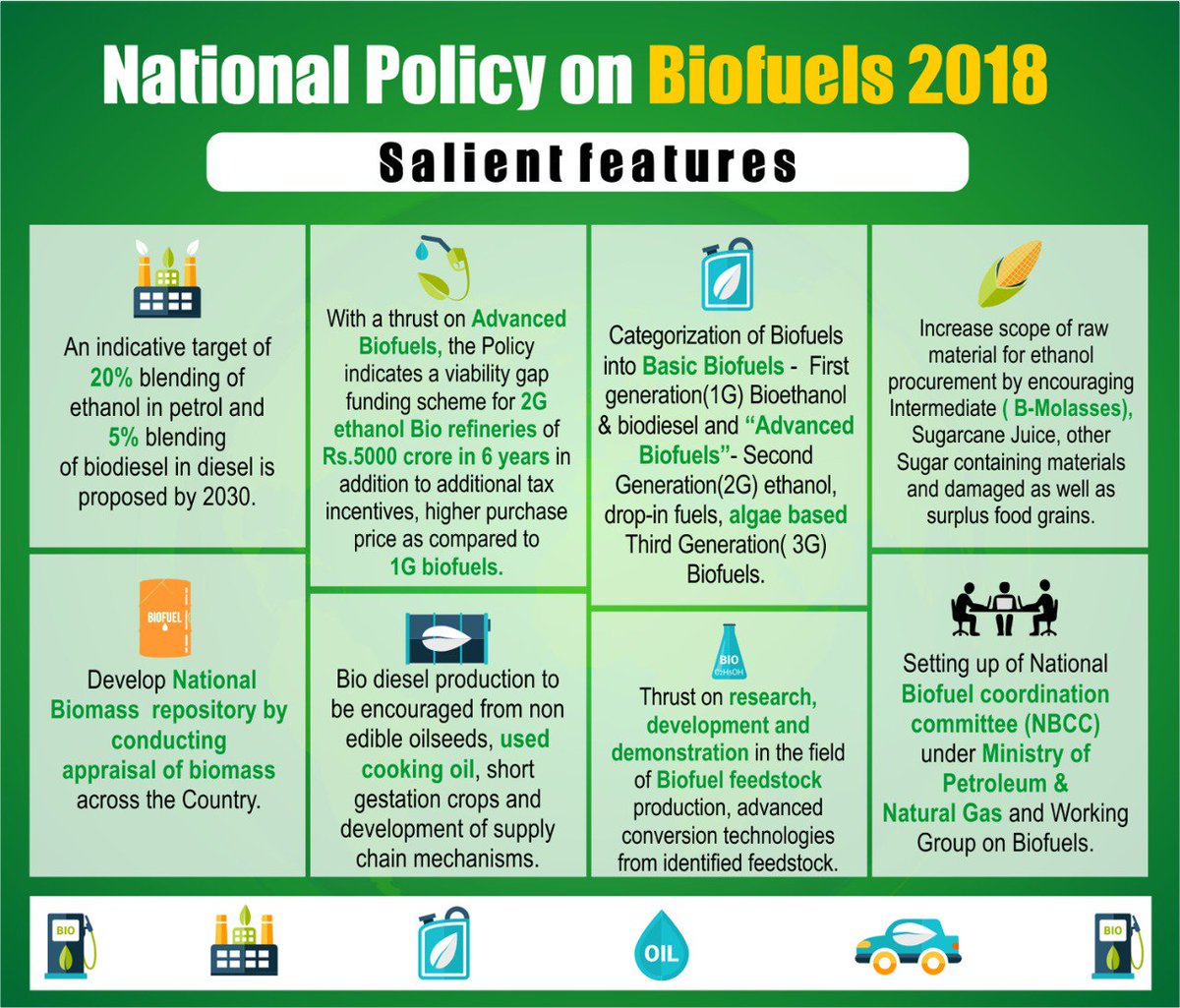
Why in News?
- In May 2018, Union Cabinet approved a National Policy on Biofuels – 2018.
- It replaces earlier policy made by Ministry of New and Renewable Energy in 2009.
What are Biofuels?
- A biofuel is a fuel that is produced through contemporary biological processes, such as agriculture and anaerobic digestion, rather than a fuel produced by geological processes such as those involved in the formation of fossil fuels, such as coal and petroleum, from prehistoric biological matter.
- Biofuels can be derived directly from plants, or indirectly from agricultural, commercial, domestic, and/or industrial wastes.
Salient Features of the Policy
- The policy categories biofuels into the following 3 categories :-
- First Generation (1G) : Also called as ‘basic fuels’, it includes bioethanol and biodiesel
- Second Generation(2G): It includes ethanol, Municipal Solid Waste (MSW) to drop-in fuels and is also known as ‘advanced fuels’
- Third Generation(3G) : Biofuels like bio-CNG
The categorization is done to enable the extension of appropriate financial and fiscal incentives under each category.
- Expands the scope of raw material: The policy allows the use of Sugarcane Juice, Sugar-containing materials like Sugar Beet, starch containing materials like Corn, Cassava, Damaged food grains like wheat, Rotten Potatoes, unfit for human consumption for ethanol production.
- Use of surplus food grains : To avoid wastage and to provide farmers appropriate prices, the policy proposes the use of surplus food grains for production of ethanol for blending with petrol with the approval of National Biofuel Coordination Committee.
- Viability Gap Funding : Policy indicates a viability gap funding scheme for 2G ethanol Bio refineries of Rs.5000 crore in 6 years.
- It encourages setting up of supply chain mechanisms for biodiesel production from non-edible oil seeds, Used Cooking Oil, short gestation crops.
Expected Benefits
- With the upswing in the oil price putting pressure on the economy, even small steps to encourage the use of biofuels are welcome.
- Reduced Import Dependency : The ethanol supply for year 2017-18 is expected to be around 150 crore liters of ethanol which will result in savings of over Rs.4000 crore of forex.
- Cleaner Environment : By reducing crop burning & conversion of agricultural residues/wastes to biofuels it will help in abetting Greenhouse Gas emissions.
- Municipal Solid Waste(MSW) management : Around 62 MMT of MSW is generated in India annually. With existing technology, there is potential to provide around 20% of drop in biofuels from one ton of MSW waste.
- Additional Income to Farmers: The otherwise burnt agricultural residues/waste can be commercialized augmenting the farmers’ income.
Implementation Challenges
- Technical Challenges : The technology for production of biofuels is still in its nascent stage and further research is needed for making it more economically viable.
- Supply Chain Management : For streamlining the movement of agricultural waste and other raw material for biofuel from source to industrial gates, robust supply chain is required which is still not well-developed.
- Limited Private Sector investment : Accelerated investment is needed in the sector which can only be achieved with the involvement of private sector whose participation has been hampered because of financial constraints and lack of cohesive support from central to local level.
- Food vs Fuel Challenge :There is the risk of diverting farmland or crops for biofuels production in detriment of the food supply which can lead to food inflation.
- Environmental Challenges : There is a risk of farmers opting for mono cropping preferring crops used for biofuel production which can disbalance local ecology as well.
Conclusion
- The Policy has the potential to transform India’s fuel market, mitigating environmental pollution, diversify farmers income and much more.
- However, the government need to take steps to remove policy barriers that have discouraged private investment in building supply chains and also need to channelise more research in new technology so as to make the production of biofuels more economically viable.

